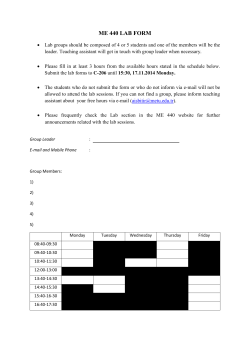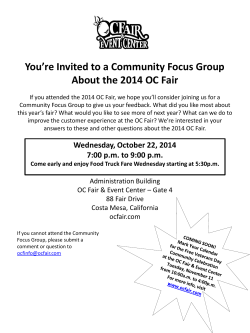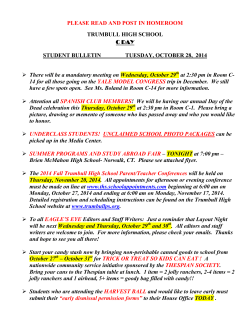
POLI 421 Framing Public Policies M, W 3:35–4:50 pm, Hamilton 452
POLI 421 Framing Public Policies M, W 3:35–4:50 pm, Hamilton 452 Spring 2015 Prof. Frank R. Baumgartner Email: Frankb@unc.edu 313 Hamilton Hall, phone 962-0414 Web site: http://www.unc.edu/~fbaum/ Office hours: M, T, W, 2:30-3:30 pm and by appointment This class will focus on the process by which policies get framed, or defined in public discussion. Framing is focusing attention on some elements of a complex public problem rather than others. Politicians constantly attempt to frame issues in ways that are advantageous to their side of the debate, and we often refer derisively to this as “spin.” But framing is inevitable. Furthermore, frames sometimes change over time. Smoking was once seen as glamorous and the tobacco industry was held up as one of the most powerful lobbies in American politics. Today you can’t smoke in most public places. So the course will focus on something you see around you every day, at least if you read the newspapers and pay attention to politics. We will begin with a review of a number of theories from political science and psychology about how we frame things, about why some frames are more powerful than others, and about how the brain processes new, unfamiliar, or unwanted information. We will pay special attention to race and how that is framed, at least for a week. Then, with this background, we will shift attention to studying how frames change over time, with a series of books and case studies: policies toward children, poverty, the “opportunity society,” income inequality, and finally we will end with a book about how clergy abuse of children became a political issue, whereas it had been going on for decades… The books we will be reading describe real politics and it should be interesting. This course is listed in the catalogue as Communication Intensive (CI) as well as Mentored Research (E6). Communication intensive courses integrate written work, oral presentation, and processes of revision into the course subject matter in substantive and important ways. Mentored Research is a form of Experiential Education (EE), and this means that you will conduct your own research project under my supervision. These characteristics of our course determine a lot of the assignments. These will therefore involve not just reading books and articles as you might in another course, but doing your own research project, handling statistical data, developing qualitative and quantitative comparisons, and drafting your final project in parts, getting feedback on them, presenting parts of them orally, and then incorporating feedback for the final project at the end of the semester. If you like this course, you will love grad school, as it gives a small taste of the research process. The course is probably a little harder than others because of this. Each day we will discuss a reading selection, but you will also have important work to be doing regularly on the side, throughout the semester. You can’t catch up in the last week of the semester if you get behind. What this means is that I will help you design a research project where you trace the framing of a public policy in much the same way as some of the authors we read in class have done. Essentially this means that you: a) pick a topic of public policy that interests you; b) identify Baumgartner, Framing Spring 2015 different ways that the issue can be framed; and c) track using media or government sources how often the different frames associated with the issue have been mentioned over time or document how policy actors with different goals frame the issue selectively. Rather than just read some books or articles and write a standard term paper, you will “get your hands dirty” with some actual research. Assignments will include a number of short projects designed to push you along the way to completing an interesting and original research project. Further, we will devote some class time to go over some technical aspects of some research skills you will need, and will be available for individual consulting during office hours as well. Your research project should involve tracing the history of a given policy over time, using media sources such as the New York Times, available for a sufficient period to observe change. The minimum acceptable is 25 years, but longer is better. The New York Times is available as a searchable database back to the 1850s, so you are welcome to study historical periods if that interests you. Some other excellent resources are ProQuest and Lexis-Nexis, available through the library web site, the Policy Agendas Project (www.policyagendas.org) which traces government attention, and Google N-Gram, which allows you to search google’s book collection for any two-word phrase: See https://books.google.com/ngrams. In any case, you will need to pay attention to identifying a policy debate very early in the semester, and then checking whether you can use computerized sources and keyword searches to identify the major frames. So you’ll need to get started early, and you may need to change your topic if you can’t measure the frames accurately. Welcome to the world of empirical research! Sometimes great ideas just aren’t feasible for reasons you might not predict; great theories often sink on the shoals of facts, evidence, and empirics… Don’t let that happen to you. Make sure before you decide on your topic that you do some dry runs to make sure you can measure key frames associated with your policy. You have three times in the semester when you have to turn in an initial draft or progress report on your paper. I will review and comment on your progress based on these draft assignments. Your final paper should then incorporate any feedback. I will also ask you to talk about your projects in class, and possibly to present to the others what you have found. In the end, your term paper will incorporate the feedback you have gotten during the semester. Your term paper will be more complete and will be double-spaced 15-20 pages including bibliography and 1-inch margins, 12 point font. I will give you a template for the paper based on how I write articles for publication. Finally, let me mention that the topic of this course is the area where I do most of my research. So come to class with questions about how we do it. You may be surprised at how simple it is in some ways, but complicated in others. In any case, you should get a real feel for the process of political science research in this class. We will pay attention in class discussion not only to the substance of the conclusions that the authors reach about how policies have or have not been reframed over time, but also how they collect their evidence and support their conclusions. Grades will be calculated as follows: Participation in class discussion Occasional quizzes on the readings, in-class, unannounced Three intermediate term paper progress reports / drafts (3 x 10%) 10% 20 30 2 Baumgartner, Framing Final paper Final exam Total Spring 2015 30 10 100% Missed class and late assignments: Missing class more than a few times will certainly affect your participation grade. Papers are due at the beginning of class on the day they are due. Any late papers / progress reports will be accepted but down-graded by 10 points after the class when they are due, then 10 more points each 24 hours including weekends; if you are late with the assignment, email me the paper. If you know ahead of time you will miss an assignment for some good reason, contact me so we may agree on an alternative, without any penalty. Similarly, if you have an illness or a university supported excuse then no penalties will apply. Just stay in touch. Caveat: I consider the syllabus in a class to be a contract. However, I do reserve the right to make changes to the syllabus, including project due dates and test dates (excluding the officially scheduled final examination), when unforeseen circumstances occur. These changes will be announced as early as possible so that students can adjust their schedules. Books for purchase: Four books are required for purchase; we read the books toward the end of the term but please buy them as soon as possible. All the other required readings should be on the class web site. Gormley, William T. Jr. 2012. Voices for Children: Rhetoric and Public Policy. Washington, DC: Brookings Institution. Lytton, Timothy D. 2008. Holding Bishops Accountable: How Lawsuits Helped the Catholic Church Confront Clergy Sexual Abuse. Cambridge: Harvard University Press. McCall, Leslie. 2013. The Undeserving Rich: American Beliefs about Inequality, Opportunity, and Redistribution. New York: Cambridge University Press. Smith, Mark A. 2007. The Right Talk: How Conservatives Transformed the Great Society into the Economic Society. Princeton: Princeton University Press. Disabilities: Please let me know in the first two weeks of class if you need any accommodation for a disability. No problem. But don’t delay in letting me know. Academic Honesty: Study together but make sure the work you hand in is your own. For all course work, the Honor Code applies; the student’s signature on her/his work confirms that the Code rules were respected. Familiarize yourselves with the Code at https://studentconduct.unc.edu/honor-system. You also need to familiarize yourself with the concept and practice of plagiarism in order to make sure that you avoid it. Plagiarism is defined as deliberate or reckless representation of another’s words, thoughts, or ideas as one’s own without attribution in connection with submission of academic work, whether graded or otherwise. Take the library’s tutorial at http://www.lib.unc.edu/instruct/plagiarism/ and ask me if you have any questions. Effort: Don’t come to class unprepared to participate. Computers and cell phones: Turn them off, period. Pay attention to the discussion. Bring paper copies of the readings, and a pad and pen to take notes. Type your notes into a computer file after class; that will help you review and learn the material. 3 Baumgartner, Framing Spring 2015 Weekly schedule and discussion topics Note: Most of these readings are easy to understand but a few get technically difficult at times. Don’t worry too much about any statistical presentations that you can’t understand. However, do your best, and come to class with questions. You should definitely understand and pay careful attention to the concepts and conclusions being presented. I’ll occasionally have quick quizzes designed to evaluate whether you’ve done the readings. This will be partially based on my sense of whether people are doing the readings. So, to avoid quizzes, come with questions and comments that show you have read the material! Week 1. Jan 7, Introduction and overview Part One: Theories of how people think and how policies are framed Week 2. Jan 12, 14 Causal stories and target populations Monday: Stone, Deborah A. 1989. Causal Stories and the Formation of Policy Agendas. Political Science Quarterly 104, 2: 281–300. Wednesday: Schneider, Anne, and Helen Ingram. 1993. Social Construction of Target Populations: Implications for Politics and Policy. American Political Science Review 87, 2: 334–47. Week 3. Jan 21 Motivated reasoning, or why it is hard to make people change their mind No class on Monday Jan 19, Happy MLK Day! Wednesday: Lord, Charles G., Lee Ross, and Mark R. Lepper. 1979. Biased Assimilation and Attitude Polarization: The Effects of Prior Theories on Subsequently Considered Evidence. Journal of Personality and Social Psychology 37 (11): 2098-2109. ***Note assignment due next Monday. See class web site for details.*** Week 4. Jan 26, 28 More on motivated reasoning Monday: Kunda, Ziva. 1990. The Case for Motivated Reasoning. Psychological Bulletin 108(3): 480-98. Wednesday: Ditto, Peter H. and David F. Lopez. 1992. Motivated Skepticism: Use of Differential Decision Criteria for Preferred and Nonpreferred Conclusions. Journal of Personality and Social Psychology 63 (4): 568-84. ***Monday, Jan 26. First assignment due in class and by email, as per class web site.*** Week 5. Feb 2, 4. Race Monday: Bonilla-Silva, Eduardo, Amanda Lewis, and David G. Embrick. 2004. I Did Not Get That Job Because of a Black Man...: The Story Lines and Testimonies of Color-Blind Racism. Sociological Forum 19, 4 (December): 555-81. Wednesday: Rattan A, Levine CS, Dweck CS, Eberhardt JL. 2012. Race and the Fragility of the Legal Distinction between Juveniles and Adults. PLoS ONE 7, 5: e36680. 4 Baumgartner, Framing Spring 2015 Eberhardt, Jennifer L., Paul G. Davies, Valerie J. Purdie-Vaughns, and Sheri Lynn Johnson. 2005/06. Looking Deathworthy: Perceived Stereotypicality of Black Defendants Predicts Capital-Sentencing Outcomes. Psychological Science 17, 5: 383-6. Part Two: Empirical studies of how policies are framed and why that matters Week 6. Feb 9, 11. Why is policy hostile to children even if children are positively framed? Gormley, William T. Jr. 2012. Voices for Children: Rhetoric and Public Policy. Washington, DC: Brookings Institution, chapters 1-2 (Monday) and 3-4 (Wednesday). ***Due on Feb 9: 2 pages (single spaced) including your term paper topic, your choice of design, 5 good citations, and the beginnings of your definition of the relevant frames surrounding the issue.*** Week 7. Feb 16, 18. More on children the consequences of framing Gormley, chapters 5-6 (Monday) and 7-8 (Wednesday). Week 8. Feb 23, 25. Framing the poor: a UNC senior thesis, revised Monday: Rose, Max, and Frank R. Baumgartner. 2013. Framing the Poor: Media Coverage and US Poverty Policy, 1960–2008. Policy Studies Journal, 41, 1: 22–53. Wednesday: Review and space for questions / lab session about your term papers. Come with practical questions about how the logisitics of your term paper projects. Week 9. Mar 2, 4. The “Right Talk” – Free market rhetoric in politics Smith, Mark A. 2007. The Right Talk: How Conservatives Transformed the Great Society into the Economic Society. Princeton: Princeton University Press, chapters 1-2 (Monday) and 3-4 (Wednesday) ***Monday Mar 2: Overview of your data collection and draft section explaining your keywords, frames, and data collection process due. 5 pages single spaced.*** March 7-15, spring break, have a great time. Think about studying, too. Week 10. Mar 16, 18. Continuation with “Right Talk” Smith, chapters 5-7(Monday) and 8-9 (Wednesday) Week 11. Mar 23, 25. How we think about income inequality McCall, Leslie. 2013. The Undeserving Rich: American Beliefs about Inequality, Opportunity, and Redistribution. New York: Cambridge University Press, Introduction and chapter 1 (Monday), chapter 2 (Wednesday) Week 12. Mar 30, April 1, TBA. No additional readings this week; work on your papers! Outline due next week. Week 13. Apr 6, 8. More on inequality McCall, chapters 3-4 (Monday), chapter 5 and conclusion (Wednesday) 5 Baumgartner, Framing Spring 2015 ***Monday April 6: Full outline of your paper due. The more you have, the more I can give feedback on. Complete drafts are certainly welcome. Double-spaced.*** Week 14. Apr 13, 15. Framing clergy sex abuse in the courts and the media Lytton, Timothy D. 2008. Holding Bishops Accountable: How Lawsuits Helped the Catholic Church Confront Clergy Sexual Abuse. Cambridge: Harvard University Press, part I (Monday) and Part II (Wednesday) Week 15. Apr 20, 22. Finishing up on framing clergy sex abuse and getting it out of the courts and into the media Monday: Lytton, Part III Wednesday: Review and summary ***Wednesday Apr 22, Term papers due.*** ***Final Exam: Monday May 4, 4:00-6:00pm, in the regular classroom *** 6
© Copyright 2025











